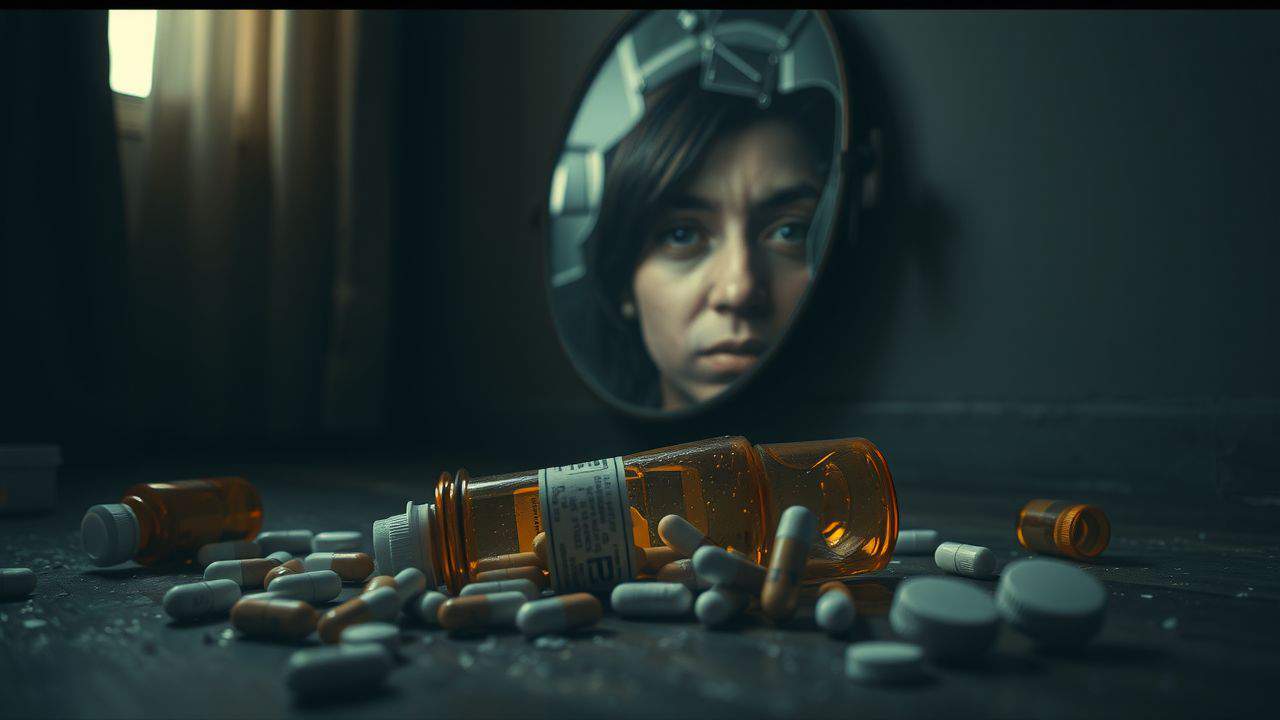Do you spend hours thinking about one thing or feel unable to stop a harmful habit? Many people mix up obsession vs addiction, but they affect our brains in different ways. This guide breaks down how each condition works and shows you clear signs to spot which one might be controlling your life.
Get ready to take back control of your thoughts and actions.
Key Takeaways
Obsessions involve intrusive thoughts and mental fixations, while addictions create physical dependencies and compulsive behaviors that harm your life despite negative consequences.
Treatment approaches differ – obsessions respond well to CBT and ERP therapy (14–20 sessions needed), while addictions require detox (5-10 days) followed by at least 90 days of rehab plus ongoing support groups.
According to United Recovery Project, addiction is a medical disease that rewires the brain’s reward system, while obsessive thoughts affect 2-3% of people worldwide through unwanted mental loops without causing physical changes.
Common addictions include substance abuse and behavioral addictions like gambling and internet use, while obsessions often manifest as OCD behaviors like excessive handwashing or checking locks repeatedly.
Both conditions are often confused since they share anxiety symptoms, but obsessions stem from mental fixations and fears, while addictions create physical dependencies that require medical intervention during withdrawal.
Table of Contents
Defining Addiction

Now that we understand the basics, let’s talk about what addiction really means. According to United Recovery Project, addiction goes way beyond just bad habits or poor choices.
It’s a serious medical and psychological disease that grabs hold of your brain and won’t let go.
Think of addiction as a monster that makes you keep doing something even though it hurts you. Your brain gets rewired to crave substances or behaviors that give you a quick high. Soon, you need more and more to feel normal.
The medical books call this a “substance use disorder,” and it comes with clear signs – you lose control, build up tolerance, and feel awful when you try to stop. You might notice physical symptoms like shaking or sweating, or mental ones like anxiety and depression.
The tricky part is that addiction doesn’t care if it’s wrecking your job, relationships, or health – it demands attention anyway.
Defining Obsession

Obsession grips your mind like a stubborn pit bull that won’t let go. Your brain fixates on specific thoughts, images, or urges that keep popping up without your permission. These intrusive thoughts stick around and cause major stress, making it tough to focus on daily tasks.
I’ve seen countless guys struggle with obsessive thoughts about germs, safety checks, or even disturbing ideas they can’t shake off.
Most guys deal with obsessive thoughts through mental rituals or strict routines. Think of it as your mind playing the same broken record over and over. The thoughts feel impossible to control and often lead to serious emotional distress.
SSRIs help many people manage these persistent thoughts, but they don’t work like magic pills. Your brain might tell you to check the door lock twenty times, or wash your hands until they’re raw.
These thoughts don’t cause physical changes in your brain like addictions do, but they can still mess up your daily life big time.
Key Characteristics of Obsession

Obsessions grip your mind like a vice, forcing you to replay the same thoughts over and over until they steal your focus and energy – want to know what makes these mental loops so powerful? Let’s find out.
Persistent intrusive thoughts

Intrusive thoughts stick to your mind like gum on a shoe. These unwanted mental images or ideas pop up without warning and refuse to leave. They create a mental traffic jam, making it hard to focus on daily tasks or enjoy simple pleasures.
Many guys face these pesky thoughts about harm, sex, or religion that clash with their values. The brain keeps playing these thoughts on repeat, causing stress and anxiety.
Your brain might tell you to check the stove twenty times or worry about hurting someone you love. These thoughts don’t make you crazy or dangerous – they’re just misfires in your mental wiring.
The mind is like a TV that won’t turn off – sometimes it plays shows we don’t want to watch.
Most men try to push these thoughts away or feel ashamed about them. The harder you fight, the stronger they become. Let’s look at how these persistent thoughts lead to difficulty focusing on other tasks.
Difficulty focusing on other tasks

People with obsessive thoughts struggle to focus on daily tasks. Their minds get stuck on one idea, like a broken record playing the same tune. Basic activities like work, studying, or even watching TV become hard.
The brain stays fixed on the obsessive thought, making it tough to shift attention elsewhere.
Mental health issues can make focusing even harder. Tasks pile up as the mind refuses to let go of nagging thoughts. Simple jobs feel like climbing a mountain. Many folks miss deadlines or make mistakes because their brain keeps circling back to the same worries.
This creates a cycle where stress builds up and makes focusing even tougher. CBT helps break this pattern by teaching new ways to handle these thoughts.
Key Characteristics of Addiction

Addiction grabs hold of your brain’s reward system and won’t let go, forcing you to chase that next high despite the mess it creates in your life – stick around to learn how to spot the warning signs and break free from its grip.
Compulsive behavior despite consequences
Compulsive behaviors stick around even when they cause serious problems. People keep gambling despite losing their savings, or shop until credit cards max out. The brain’s reward system gets hijacked, making it tough to stop these actions.
I’ve seen countless patients continue their behaviors despite job losses, broken relationships, and mounting debts. These actions feel impossible to control, like a car with broken brakes racing downhill.
The chains of habit are too light to be felt until they are too heavy to be broken.
The body and mind create a powerful loop of cravings and actions. Your brain releases feel-good chemicals during these behaviors, which makes you want more. Think of it like a hungry bear raiding a campsite – it knows the behavior is risky, but can’t resist the reward.
Physical symptoms like shaking, sweating, or anxiety pop up when trying to stop. Support groups and CBT offer practical tools to break free from these patterns. Many people need professional help to overcome these stubborn habits.
Physical or psychological dependence
The body’s response to harmful behaviors goes beyond mere actions. Physical dependence shows up through clear signs like shaking hands or upset stomachs when someone stops their usual substance.
The brain creates strong links to triggers, making it hard to break free from addictive patterns.
Mental dependence grabs hold through powerful brain changes. Your mind starts to need the substance or behavior to feel normal. This need grows stronger over time, pushing you to keep going despite the harm it causes.
The brain’s reward system gets rewired, making natural pleasures seem less exciting compared to the addictive stimulus. Your body builds up tolerance, so you need more to get the same effect.
These changes can stick around long after you stop using, which explains why recovery takes time and support.
Common Types of Obsession

Obsessions can range from mild fixations to severe mental blocks that control your daily life – from counting steps to checking locks multiple times, or having scary thoughts about harming yourself or others.
Want to know if your habits cross the line between normal and obsessive? Keep reading to spot the warning signs.
Obsessive-compulsive behaviors
Obsessive-compulsive behaviors grip people in a cycle of repeated actions. People with OCD feel stuck doing tasks like washing hands, checking locks, or counting steps over and over.
These actions stem from deep fears about germs, safety, or bad luck. Up to 3% of people worldwide deal with these tough patterns daily. The brain sends false danger signals, making normal tasks feel like life-or-death situations.
OCD isn’t about being neat – it’s about being trapped in a loop you can’t escape.
I used to count my steps to and from work, convinced something bad would happen if I didn’t. The fear of contamination makes people wash their hands until they bleed. Some folks check their stoves twenty times before leaving home.
These behaviors aren’t quirks – they’re real mental health struggles that need proper help. CBT and exposure therapy work well to break these patterns. The key lies in facing fears step-by-step while learning new ways to handle stress.
Intrusive thought patterns
Intrusive thoughts can appear in your head like unwanted guests at a party. These thoughts might focus on harm, embarrassing situations, or taboo topics. I dealt with recurring thoughts about leaving my stove on, which made me check it ten times before leaving home.
Studies show 2-3% of people face similar battles with obsessive thoughts daily. These mental patterns create a loop of worry and doubt that feels impossible to break.
Your brain might get stuck on these thoughts like a broken record. They grab your attention and won’t let go until you perform certain actions or rituals. The thoughts don’t define who you are – they’re just misfires in your mind’s warning system.
Many guys struggle with intrusive thoughts about driving off bridges or hurting loved ones, even though they’d never act on these ideas. These patterns often lead to specific compulsive behaviors that affect daily life.
We can discuss how these compulsive behaviors develop and impact your routine.
Common Types of Addiction

From gambling to drugs, addictions come in many forms that can grip your mind and body – want to know which ones might be affecting you or someone you care about? Let’s check them out.
Substance addiction
Substance addiction grabs hold of your brain and won’t let go. Your body starts to need drugs or alcohol just to feel normal. Most people battle with alcohol, opioids, stimulants, or nicotine.
The scary part? Your body builds up a tolerance, forcing you to use more and more to get the same effect. This leads to a nasty cycle where you can’t stop using, even if you want to.
The real kicker shows up if you try to quit. Your body fights back with withdrawal symptoms that can knock you flat. Many guys think they can handle it alone, but that’s like trying to bench press twice your weight without a spotter – risky and potentially dangerous.
Studies show when addicts relapse, they often need professional help to break free. Support groups, counseling, and medical care make a huge difference in beating substance abuse.
Behavioral addiction (e.g., gambling, internet use)
Behavioral addictions grab hold of your brain just like drugs do. Your mind craves the rush from gambling, gaming, or endless social media scrolling. I’ve seen guys lose thousands at poker tables, unable to walk away despite empty bank accounts.
The brain lights up with pleasure signals, making you chase that high over and over. CBT helps break these patterns by teaching new ways to cope with triggers.
Internet use turns into addiction when you can’t stop checking your phone or computer. Many guys spend 8+ hours daily online outside of work, missing sleep and skipping meals. The constant dopamine hits from likes, messages, and notifications create real dependency.
Family support plus therapy works best to regain control. Small steps like app blockers and scheduled offline time help build healthier habits.
Treatment Approaches for Obsession

Doctors use proven methods like CBT and ERP to break the cycle of obsessive thoughts, and you’ll discover which treatment fits your needs in the next section.
Cognitive-behavioral therapy (CBT)
CBT stands as a powerful tool to tackle both obsessive thoughts and addictive behaviors. This therapy helps you spot harmful thinking patterns and replace them with better ones. Most people need 14 to 20 sessions to see real progress.
I’ve watched many clients break free from their mental chains through CBT’s practical exercises and homework tasks.
Your therapist acts like a coach who teaches you to catch negative thoughts as they pop up. You’ll learn to question these thoughts and test if they match reality. The best part? CBT gives you skills you can use for life.
These skills help you handle stress, fight urges, and build healthier habits. Many guys find CBT less scary than other therapies because it focuses on fixing problems right now rather than digging into past issues.
Exposure and response prevention (ERP)
Exposure and response prevention helps people break free from obsessive thoughts. This treatment puts you face-to-face with your fears in a safe space. You’ll learn to resist the urge to perform compulsive actions while dealing with anxiety-triggering situations.
Medical data shows this method works well, with 50-60% of patients seeing big improvements after finishing their treatment.
ERP therapy follows clear steps to tackle unwanted thoughts head-on. Your therapist guides you through feared situations while teaching you better coping skills. Think of it like training at the gym – each session builds your mental strength to handle tough moments.
The treatment targets both the mental fixation and physical responses that feed into obsessive patterns. Many guys find relief through this proven approach to managing intrusive thoughts.
Treatment Approaches for Addiction

Addiction treatment centers offer a mix of detox programs, group therapy, and one-on-one counseling – want to know which path fits you best? ????
Detoxification and rehabilitation
Detox marks the first step toward breaking free from substance abuse. Your body needs time to flush out harmful chemicals and reset its natural balance. Most people stay in detox for 5-10 days, depending on the substance and how long they’ve used it.
Medical staff watch vital signs and give medications to ease withdrawal symptoms like shaking, sweating, or nausea. This phase helps prevent dangerous complications that can pop up during withdrawal.
Rehab builds on the foundation that detox creates. You’ll learn new ways to handle stress without turning to drugs or alcohol. Group therapy sessions let you connect with others who face similar battles.
One-on-one counseling digs into what drove your substance use in the first place. Studies show that longer treatment times lead to better results – many experts suggest at least 90 days of combined detox and rehab.
The process isn’t easy, but it gives you tools to build a healthier life. Support groups and therapy continue after rehab to help maintain sobriety.
Counseling and support groups
After detox, your path to recovery needs strong support. Group therapy works great with medicine to beat opioid use. I’ve seen countless guys find strength in these groups. You’ll meet others who get what you’re going through.
The shared stories and tips make a real difference.
Support groups offer a safe space to talk freely about your struggles. Trained counselors guide these sessions using proven methods like CBT. They help you spot triggers and build better habits. You can learn more about how CBT supports long-term recovery by addressing the underlying thought patterns driving your behavior.
Many guys in my groups started as strangers but became close friends who lift each other up. The mix of professional help and peer support creates a powerful healing combo. Groups also teach stress management skills you can use daily.
Obsession vs. Addiction: Core Differences

Obsessions trap your mind in endless loops of thoughts, while addictions chain your body to harmful actions – and knowing which one grips you can make all the difference in getting the right help.
Want to learn how to break free from these mental chains? Keep reading to discover the exact steps you need to take control back.
Mental fixation vs. compulsive actions
Mental fixation grabs your thoughts and won’t let go, like a song stuck in your head on repeat. Your brain gets stuck on one idea, making it hard to think about anything else. This mental loop differs from the physical pull of compulsive actions.
People with OCD might spend hours thinking about germs, while those with substance abuse act on their urges through repeated behaviors.
Compulsive actions show up as physical behaviors you can’t control, even if they hurt you. Think of a gambler who keeps betting despite empty pockets, or someone reaching for alcohol despite job troubles.
The brain creates a reward system that demands these actions, unlike the pure thought patterns of mental fixation. CBT helps break both thought patterns and actions by teaching new coping skills.
Primary causes and impacts
Life events trigger both obsessions and addictions in different ways. Past trauma pushes people toward addictive behaviors as a quick escape from pain. Obsessive thoughts often stem from deep-seated fears or genetic factors that mess with brain chemistry.
I’ve seen guys at my support group struggle with both – some turned to alcohol after losing their jobs, while others developed checking rituals from childhood anxiety. The impacts hit hard in every area of life.
Substance abuse destroys careers and relationships through missed work and angry outbursts. Obsessive thoughts drain mental energy and create social isolation.
Brain chemistry plays a huge role in both conditions. Addictions hijack the reward system by flooding it with feel-good chemicals, while obsessive thoughts get stuck in loops due to low serotonin levels.
These issues need different treatment approaches to heal. CBT helps break obsessive thought patterns, while addiction often requires medical help for withdrawal. The good news? Both conditions respond well to proper treatment.
Many guys I know have rebuilt their lives through therapy, support groups, and sometimes medication. Getting help early makes recovery easier.
Why Obsession and Addiction Are Often Confused

People mix up obsession and addiction because both show similar signs. A person with obsessive-compulsive disorder might check their door locks twenty times, while someone with a gambling addiction keeps betting despite losing money.
Both conditions create strong urges that feel impossible to control. The brain tricks you into thinking these actions are vital for survival, making it hard to tell them apart.
Many guys struggle to spot the difference between obsessive thoughts and addictive behaviors in their daily lives. The main confusion stems from how both problems cause anxiety and lead to repeated actions.
Think of obsession as a stuck record playing the same scary tune in your head. Addiction works more like a reward system gone wrong – your brain craves something that feels good, even if it hurts you.
Medical experts often need special tests to tell these conditions apart because they share so many symptoms.
People Also Ask
What’s the key difference between obsession and addiction?
Obsession involves intrusive thoughts and compulsive behaviors, while addiction leads to substance abuse or behavioral addictions. Think of obsession as a stuck record in your mind, while addiction is like a chain you can’t break.
How do I know if I need help for obsessive thoughts or addiction?
If intrusive thoughts or addictive behaviors affect your daily life, seek help. Warning signs include feeling out of control, using substances as a coping mechanism, or having thoughts about harming oneself.
What treatments work for both conditions?
Doctors often use cognitive-behavioral therapy (CBT) or dialectical behavioral therapy (DBT) for both. Some people also need selective serotonin reuptake inhibitors (SSRIs) or medical intervention. Art therapy helps too.
Can someone have both obsession and addiction?
Yes! This is called dual diagnosis. Many people deal with both obsessive-compulsive disorder (OCD) and substance addictions. It’s like fighting two battles at once.
How do natural rewards differ from addiction triggers?
Natural rewards boost your neurotransmitters in healthy ways, while addiction hijacks these same brain systems. It’s like comparing a sunny day high to a dangerous artificial rush.
What role do traumatic events play?
Traumatic events can spark both obsessive thoughts and addiction. Many addiction counselors help people work through past trauma using individual therapies. It’s about healing old wounds to stop unhealthy patterns.
References
https://pmc.ncbi.nlm.nih.gov/articles/PMC3210595/
https://cassioburycourt.com/2023/11/whats-the-difference-between-addiction-and-obsession/
https://www.pyramid-healthcare.com/addictive-vs-obsessive-whats-the-difference/ (2024-04-25)
https://pmc.ncbi.nlm.nih.gov/articles/PMC10899460/
https://www.verywellmind.com/the-difference-between-an-addiction-and-a-compulsion-22240
https://www.addictioncenter.com/addiction/addiction-vs-dependence/
https://www.ncbi.nlm.nih.gov/books/NBK553162/
https://pmc.ncbi.nlm.nih.gov/articles/PMC7370844/
https://my.clevelandclinic.org/health/diseases/6407-addiction
https://www.pcicenters.com/obsession-vs-addiction/
https://americanaddictioncenters.org/behavioral-addictions (2024-06-24)
https://www.addictioncenter.com/behavioral-addictions/
https://pmc.ncbi.nlm.nih.gov/articles/PMC11170287/
https://pmc.ncbi.nlm.nih.gov/articles/PMC6935308/
https://pmc.ncbi.nlm.nih.gov/articles/PMC8793233/
https://www.ncbi.nlm.nih.gov/books/NBK235506/
https://nida.nih.gov/publications/drugs-brains-behavior-science-addiction/treatment-recovery
https://pmc.ncbi.nlm.nih.gov/articles/PMC8215831/
https://www.4seasonsdetox.com/blog/obsession-vs-addiction-the-differences-and-impact-on-mental-health/ (2024-07-18)
https://psychcentral.com/pro/exhausted-woman/2015/04/the-difference-between-an-obsession-and-an-addiction (2015-04-28)

